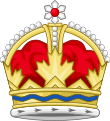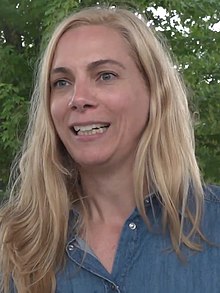Minister of Canadian Heritage
| Minister of Canadian Heritage | |
|---|---|
| Ministre du Patrimoine canadien | |
since July 26, 2023 | |
| Department of Canadian Heritage | |
| Style | The Honourable |
| Member of | |
| Reports to | |
| Appointer | Monarch (represented by the governor general);[3] on the advice of the prime minister[4] |
| Term length | At Thy Majesty's pleasure |
| Inaugural holder | Sheila Copps |
| Formation | 12 July 1996 |
| Salary | CA$269,800 (2019)[5] |
| Website | www |
 |
|---|
The minister of Canadian heritage (French: ministre du patrimoine canadien) is the minister of the Crown who heads Canadian Heritage, the department of the Government of Canada responsible for culture, media, sports, and the arts.
History
[edit]The position was created in 1996 to combine the posts of minister of multiculturalism and citizenship and minister of communications. The "status of women" was merged from the minister responsible for the status of women in 2006. In 2008, the status of women portfolio was transferred to a minister of state.
On August 16, 2013, the multiculturalism portfolio was assigned to Jason Kenney, who was appointed minister for multiculturalism in addition to his other portfolios.
Those portfolios and responsibilities such as for the Canadian Race Relations Foundation, were returned to the heritage minister with the swearing in of the 29th Canadian Ministry in November 2015.[6] The heritage minister also gained responsibility for the National Capital Commission, which was formerly under the senior Ottawa-area cabinet minister under the Harper government; and the Canadian secretary to the Queen, which was previously under the Privy Council Office.[6]
Traditionally, the minister attends the Juno Awards to present the awards for Breakthrough Artist and Breakthrough Group Of The Year.
List of ministers
[edit]Key:
| No. | Name (Portfolio) | Term of office | Political party | Ministry | |
|---|---|---|---|---|---|
| 1 | Sheila Copps (Canadian Heritage) |
July 12, 1996 | December 11, 2003 | Liberal | 26 (Chrétien) |
| 2 | Hélène Scherrer (Canadian Heritage) |
December 12, 2003 | July 19, 2004 | 27 (Martin) | |
| 3 | Liza Frulla (Canadian Heritage) |
July 20, 2004 | February 5, 2006 | ||
| 4 | Bev Oda (Canadian Heritage and Status of Women) |
February 6, 2006 | August 14, 2007 | Conservative | 28 (Harper) |
| 5 | Josée Verner (Canadian Heritage and Status of Women) |
August 14, 2007 | October 29, 2008 | ||
| 6 | James Moore (Canadian Heritage and Official Languages) |
October 30, 2008 | July 15, 2013 | ||
| 7 | Shelly Glover (Canadian Heritage and Official Languages) |
July 15, 2013 | November 4, 2015 | ||
| 8 | Mélanie Joly (Canadian Heritage) |
November 4, 2015 | July 18, 2018 | Liberal | 29 (J. Trudeau) |
| 9 | Pablo Rodriguez (Canadian Heritage and Multiculturalism) |
July 18, 2018 | November 20, 2019 | ||
| 10 | Steven Guilbeault (Canadian Heritage) |
November 20, 2019 | October 26, 2021 | ||
| (9) | Pablo Rodriguez (Canadian Heritage) |
October 26, 2021 | July 26, 2023 | ||
| 11 | Pascale St-Onge (Canadian Heritage) |
July 26, 2023 | Incumbent | ||
Responsibilities
[edit]Prior to 2003, their responsibilities included National Parks and historic sites. The Minister of Canadian Heritage is responsible for:
- Department of Canadian Heritage
- Canada Council for the Arts
- Canadian Broadcasting Corporation
- Canadian Race Relations Foundation[6]
- Canadian Radio-television and Telecommunications Commission
- Canadian Secretary to the King[6]
- Library and Archives Canada
- National Arts Centre
- National Battlefields Commission
- National Capital Commission[6]
- National Film Board of Canada
- Canadian Museum of History
- Canadian War Museum
- Virtual Museum of New France
- Canadian Museum for Human Rights
- Canadian Museum of Immigration at Pier 21
- Canadian Museum of Nature
- Ingenium (Canada Science and Technology Museum, Canada Agriculture and Food Museum, Canada Aviation and Space Museum)
- National Gallery of Canada
- Portrait Gallery of Canada)
- Public Service Commission of Canada
- Public Service Staff Relations Board
- Telefilm Canada
General duties
[edit]The minister's general powers, duties, and functions are set out by section 4 of the Department of Canadian Heritage Act,[7] which provides as follows:
(1) The powers, duties and functions of the Minister extend to and include all matters over which Parliament has jurisdiction, not by law assigned to any other department, board or agency of the Government of Canada, relating to Canadian identity and values, cultural development and heritage.
(2) The Minister’s jurisdiction referred to in subsection (1) encompasses, but is not limited to, jurisdiction over
- the promotion of a greater understanding of human rights, fundamental freedoms and related values;
- multiculturalism;
- the arts, including cultural aspects of the status of the artist;
- cultural heritage and industries, including performing arts, visual and audio-visual arts, publishing, sound recording, film, video and literature;
- national battlefields;
- the encouragement, promotion and development of sport;
- the advancement of the equality of status and use of English and French and the enhancement and development of the English and French linguistic minority communities in Canada;
- state ceremonial and Canadian symbols;
- broadcasting, except in respect of spectrum management and the technical aspects of broadcasting;
- the formulation of cultural policy, including the formulation of cultural policy as it relates to foreign investment and copyright;
- the conservation, exportation and importation of cultural property; and
- national museums, archives and libraries.
In addition, sections 42 to 44 of the Official Languages Act confer certain other responsibilities on the minister of Canadian heritage[8] (see minister responsible for Official Languages (Canada)).
References
[edit]- ^ "The Canadian Parliamentary system - Our Procedure - House of Commons". www.ourcommons.ca. Retrieved 2020-04-20.
- ^ "Review of the Responsibilities and Accountabilities of Ministers and Senior Officials" (PDF).
- ^ "Constitutional Duties". The Governor General of Canada. Retrieved 2020-04-20.
- ^ "House of Commons Procedure and Practice - 1. Parliamentary Institutions - Canadian Parliamentary Institutions". www.ourcommons.ca. Retrieved 2020-04-20.
- ^ "Indemnities, Salaries and Allowances". Library of Parliament. April 11, 2018. Archived from the original on June 1, 2017. Retrieved September 21, 2017.
- ^ a b c d e McGregor, Janyce (7 November 2015). "Justin Trudeau's cabinet: 6 changes found in the fine print". CBC News. Retrieved 7 November 2015.
- ^ Department of Canadian Heritage Act, S.C. 1995, c. 11
- ^ Official Languages Act, R.S.C. 1985, c. 31 (4th Supp.)

